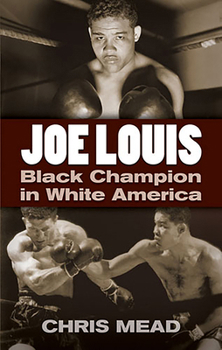Joe Louis: Black Champion in White America
Select Format
Select Condition 
Book Overview
"A stunning piece of work that transcends the genre of sports biography." -- Kirkus Reviews
"Boxing aficionados will be fascinated . . . a valuable addition to American social history." -- Washington Post Book World
"This outstanding book not only chronicles the career of a great boxer, but charts the rise of sports as a legitimate form of American recreation and the public's changing perception of the Afro-American athlete. . . . Thorough and compelling." -- San Francisco Chronicle
This critically acclaimed biography chronicles the life and times of Joe Louis, the famed African-American pugilist. Known affectionately as The Brown Bomber, Louis held the heavyweight boxing championship for a record eleven years and blazed a trail in professional sports for Jackie Robinson and other black athletes.
A dynamic combination of sports and social history, this narrative traces the champion's rise from abject poverty in the segregated South to his gradual acceptance and eventual adulation by the American public of the 1930s and '40s. Dramatic accounts of his triumphs in the ring include his finest hour: the 1938 defeat of Max Schmeling, Hitler's champion, which made Louis the living symbol of American freedom and human rights. Fourteen photographs illustrate this compelling biography.
"Boxing aficionados will be fascinated . . . a valuable addition to American social history." -- Washington Post Book World
"This outstanding book not only chronicles the career of a great boxer, but charts the rise of sports as a legitimate form of American recreation and the public's changing perception of the Afro-American athlete. . . . Thorough and compelling." -- San Francisco Chronicle
This critically acclaimed biography chronicles the life and times of Joe Louis, the famed African-American pugilist. Known affectionately as The Brown Bomber, Louis held the heavyweight boxing championship for a record eleven years and blazed a trail in professional sports for Jackie Robinson and other black athletes.
A dynamic combination of sports and social history, this narrative traces the champion's rise from abject poverty in the segregated South to his gradual acceptance and eventual adulation by the American public of the 1930s and '40s. Dramatic accounts of his triumphs in the ring include his finest hour: the 1938 defeat of Max Schmeling, Hitler's champion, which made Louis the living symbol of American freedom and human rights. Fourteen photographs illustrate this compelling biography.
Format:Paperback
Language:English
ISBN:0486471829
ISBN13:9780486471822
Release Date:October 2010
Publisher:Dover Publications
Length:352 Pages
Weight:0.80 lbs.
Dimensions:0.7" x 5.4" x 8.6"
Customer Reviews
1 rating
The life and times of America's greatest prize fighter
Published by Thriftbooks.com User , 16 years ago
This book chronicles the life and times of Joe Louis, a prize fighter that many Americans still consider to be the greatest professional pugilist of all time - and with good reason. But, as this book so ably demonstrates, Louis's greatness goes far beyond his exploits in the ring. For it is what Louis did both in and outside the ring that sets him apart and, in many respects, above all other contenders for this honor. Louis rose from abject poverty, the seventh child of an Alabama sharecropper who was committed to an insane asylum when Louis was only two, to become the heavyweight champion of the world at a time when the South was segregated along racial lines and prejudice was rampant in America. In the 1930s, primarily because of his continuing bouts, Louis was the only Negro athlete who couldn't be ignored by the major radio and print media and, therefore, who could not be ignored by the public at large. He was, in fact, regarded by the media of the time as the only important representative of his race. And, as such, during most of that time the public routinely rooted against him. That all began to change, however, when, on June 22, 1938, Louis gave Max Schmeling a rematch, this time for the Heavyweight Championship of the World. With Adolph Hitler's Third Reich now on the march, and Schmeling viewed as the representative of that racist regime; America held its collective breath as Joe Louis, a black man, was now seen as the symbol of American freedom and human rights. Louis did not disappoint. He knocked Schmeling out in the first round. Suddenly white America began seeing Louis more as an athlete, and less as a black man, and many began cheering for him. More followed when, about a month after the Japanese bombed Pearl Harbor, Louis defended his title, conservatively valued at $1,000,000.00, for exactly $0,000,000.00, donating his entire purse to the Navy Relief Fund for the families of those killed on December 7, 1942. The following day he joined the United States Army, later defending his title once again for zero dollars, this time giving his entire purse to Army Relief. During his stint in the army, Louis traveled over 70,000 miles, both in and out of the United States, and put on ninety-six exhibition fights to entertain America's soldiers. All for free. Sadly, the forty-six months that Joe Louis served in the army were taken from the prime of his boxing career. When he was finally discharged and was able to resume his career, he was thirty-two years old and his skills had diminished. To make matters worse, during World War II, Congress had raised the top tax rate to 90%, making it impossible for Louis to ever pay his 1941 taxes, which were deferred when he joined the army in 1942. In his attempt to do so, Joe fought well past his prime but, even so, he spent the rest of his life deeply in debt to the country he served so well. Though Joe had his faults, as this book shows quite clearly, he was certainly a great f





